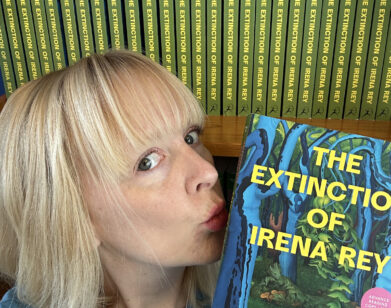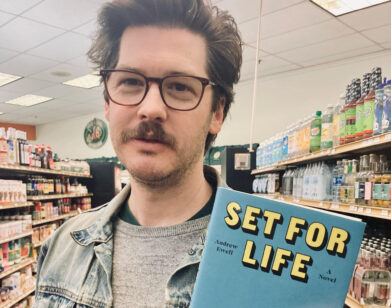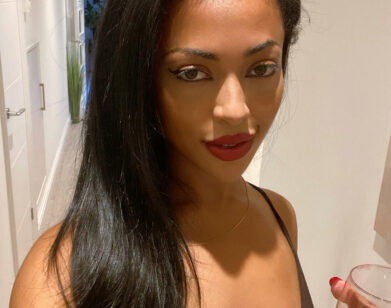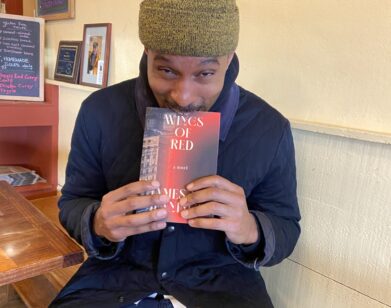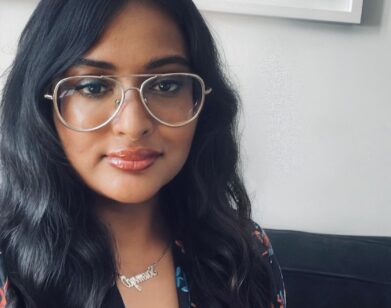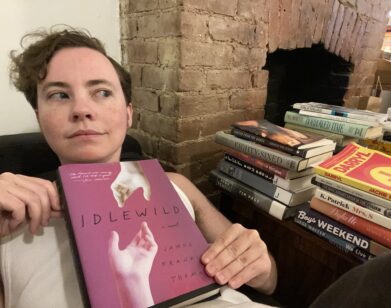OPEN BOOK
“Sex, Food, and Party Scenes”: Emma Copley Eisenberg Tells Us What She Looks For in a Book
This is OPEN BOOK, a monthly column in which we ask debut authors about their reading and writing habits. This month, we spoke to Emma Copley Eisenberg about her “road novel crossed with queer group house novel,” Housemates. Housemates follows Bernie and Leah, who forge an intense friendship when Bernie joins Leah’s eclectic domicile in West Philly. Together they embark on a road trip that leads them beyond the “queer shtetl vibes” of their neighborhood through rural Pennsylvania and, eventually, to the home of Bernie’s recently deceased photography professor, who left behind a complex legacy. “I have a theory that dense urban places and wild rural places are more alike than either of them are to the suburbs,” Eisenberg remarks. This core journey of Housemates invites a larger conversation about uncategorizable relationships, where they thrive, and how they are remembered. Just before her book’s release, Eisenberg answered our questionnaire, where she gets into the formative reading experiences that taught her about orgasms and why paperbacks, as opposed to hard covers, are “readier for the world.”
———
Where do you like to write?
I am a fanatic about noise so I cannot be trusted to write in coffee shops or public places! I write at home in my office usually or in someone else’s quiet office that they have lent me temporarily. A view is pretty nice, but I’ve come to prefer my view of my neighbor’s brick wall.
When do you like to write?
In the morning, before my anxiety kicks in. If it’s 1pm, the day is basically shot with emails and other responsibilities. The less time between waking and starting to write, the better for me.
A theme that is essential to Housemates is the idea of ways of seeing, connected, of course, with photography as a medium. When Bernie first enters the housemate’s house she observes that “it wasn’t that they didn’t know beauty…it was just that they did not care for it.” “The way an object acted upon the eye or any part of the body didn’t matter here.” How does this larger philosophical question of functionality vs. beauty play into your own process?
Oh man, it shows up all the time. I think I’m constantly wrestling with the idea of fiction writing as entertainment or for aesthetic enjoyment versus the idea of fiction as an urgent form of communication about the things that matter most. Writing this book helped me see that this divide is arbitrary. The most beautiful sentences can also be the most just; there is justice to be found in just rendering a fat body with precision, sex appeal, and love.
Tell us about a formative early reading experience.
My mom was a children’s librarian so I was spoiled with good things to read as a kid. I was really obsessed with Tamora Pierce’s The Song of the Lioness quartet series about Alanna of Trebond. These books were fucking fun and they were well plotted and had interesting things to say about gender, but I think what I remember most is learning about periods and orgasms from them. I remember feeling turned on because Alanna felt turned on during sex with George, King of Thieves. These were the first books I read where the character was really embodied, where I felt what she felt in her skin. I never forgot that.
Housemates is set in Pennsylvania and explores the tension between Philadelphia and the rural/suburban areas of the state. What was your approach to setting with this book?
There would be no Housemates without Philly, specifically West Philly, where I’ve lived for the past thirteen years, and without Pennsylvania, with its specific natural and cultural history as a place divided. This novel was born from a sense of feeling both deep love and deep frustration with the close-knit, liberation-focused, and queer shtetl vibes of my neighborhood in 2018, and the sense that where I lived both protected me from harm and kept me from seeing certain truths about the broader state where I lived. A bubble is beautiful and a bubble also has to burst. I wanted my main characters, Leah and Bernie, to be grappling with these questions of place and truth too. I knew the book would start out in Philly, that the duo would have to leave in order to answer their questions, but that ultimately they would want and need to come back. I wanted to show that rural places are home to people grappling with things that are just as complex as those my urban characters were grappling with, and that queer and trans people can thrive in rural areas. I have a theory that dense urban places and wild rural places are more alike than either of them are to the suburbs.
What’s the last book you loved, and why?
Brother and Sister Enter The Forest by Richard Mirabella. Besides being about siblings, which I don’t think enough novels are about, Mirabella is just such a sharp, tender and unexpected writer on the line level. He was doing things with time and POV that had hugely exciting things to say about trauma, but also it was just such a deeply immersive book. I felt so INSIDE it that when it was over I felt a bit bereft?
Housemates is a road novel. What are some of your personal favorite road novels? Did you draw inspiration from any of them?
It’s a road novel crossed with a queer group house novel! It’s super interested in intense domestic spaces, spaces that make unusual intimacy possible, whether in the kitchen while cooking separate dinners or in a car. Underneath every road novel is also a coming home novel, which this one is too. The Price of Salt by Patricia Highsmith is the perfect road novel in my opinion; also Nevada by Imogen Binnie.
A book you think should be in the canon, but isn’t:
I read Carson McCullers’ The Heart is a Lonely Hunter in high school, but I think it’s since gone out of fashion with contemporary readers and I’m sad. It’s a really modern book about loneliness, and empathy, across lines of difference, and queerness and deafness and labor exploitation and white supremacy in the American South.
A book you think shouldn’t be in the canon, but is:
I personally do not understand the hubbub over Lauren Groff’s Fates and Furies, which was recently included in The Atlantic’s package on The Great American Novel. It’s also a deeply fatphobic book, with hatred of fat people shot through every section and every character’s POV.
What’s your favorite bookstore?
I’m partial to my lovely indie The Head & The Hand here in Philadelphia, since they’ve been such a great ally to Blue Stoop, the nonprofit home for writers I helped found. The inventory is curated and the owners are just the nicest.
Hardcover or paperback? Why?
Paperback. If it’s a hardcover and I love the book, there always comes a point when I throw the jacket on the floor out of sheer interest and devotion. But then a cat comes along and steps on the jacket or I spill ice cream on it, and no one wants that. Paperbacks are readier for the world.
What do you look for in a reading experience?
I want real feeling and I want ambition! Done am I with slim disaffected novels of limited scope and great cruelty. Give me your fat, tender, big-hearted, swing for the fences, full of weird long sentences books please, but make them also funny and full of sex, food, and party scenes. In short, I’m looking for delight.


